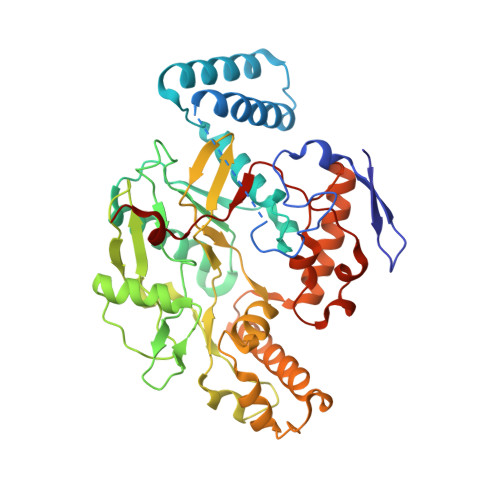Selective monocationic inhibitors of neuronal nitric oxide synthase. Binding mode insights from molecular dynamics simulations.
Huang, H., Ji, H., Li, H., Jing, Q., Labby, K.J., Martasek, P., Roman, L.J., Poulos, T.L., Silverman, R.B.(2012) J Am Chem Soc 134: 11559-11572
- PubMed: 22731813
- DOI: https://doi.org/10.1021/ja302269r
- Primary Citation of Related Structures:
3UFO, 3UFP, 3UFQ, 3UFR, 3UFS, 3UFT, 3UFU, 3UFV, 3UFW, 4EUX - PubMed Abstract:
The reduction of pathophysiologic levels of nitric oxide through inhibition of neuronal nitric oxide synthase (nNOS) has the potential to be therapeutically beneficial in various neurodegenerative diseases. We have developed a series of pyrrolidine-based nNOS inhibitors that exhibit excellent potencies and isoform selectivities (J. Am. Chem. Soc. 2010, 132, 5437). However, there are still important challenges, such as how to decrease the multiple positive charges derived from basic amino groups, which contribute to poor bioavailability, without losing potency and/or selectivity. Here we present an interdisciplinary study combining molecular docking, crystallography, molecular dynamics simulations, synthesis, and enzymology to explore potential pharmacophoric features of nNOS inhibitors and to design potent and selective monocationic nNOS inhibitors. The simulation results indicate that different hydrogen bond patterns, electrostatic interactions, hydrophobic interactions, and a water molecule bridge are key factors for stabilizing ligands and controlling ligand orientation. We find that a heteroatom in the aromatic head or linker chain of the ligand provides additional stability and blocks the substrate binding pocket. Finally, the computational insights are experimentally validated with double-headed pyridine analogues. The compounds reported here are among the most potent and selective monocationic pyrrolidine-based nNOS inhibitors reported to date, and 10 shows improved membrane permeability.
Organizational Affiliation:
Department of Chemistry, Chemistry of Life Processes Institute, amd Center for Molecular Innovation and Drug Discovery, Northwestern University, 2145 Sheridan Road, Evanston, Illinois 60208-3113, USA.



















